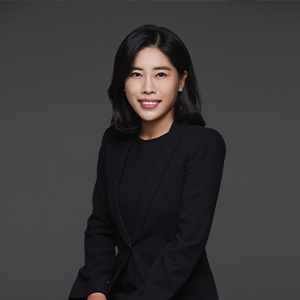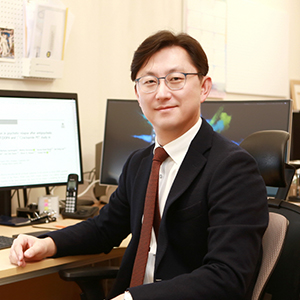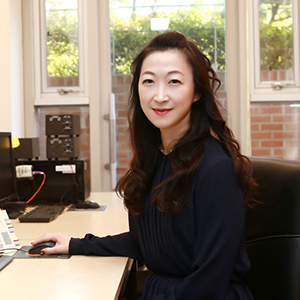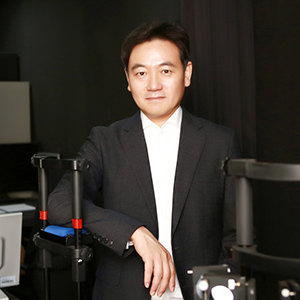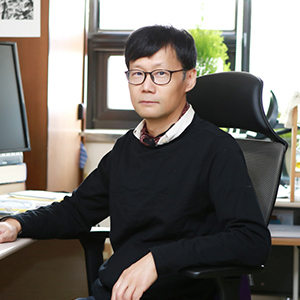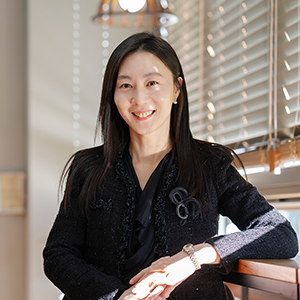Professors
-
Jeehyun KwagJeehyun Kwag 곽지현 jkwag@snu.ac.kr
Dr. Kwag received her BA in Mathematics from University of Oxford, after which she pursued research degrees in neuroscience by receiving MSc in Neuroscience and DPhil in Physiology from University of Oxford as a Clarendon Scholar. She was a faculty member at the Department of Brain and Cognitive Engineering, Korea University from 2010 before joining BCS in 2022. She uses interdisciplinary approaches including in vitro electrophysiology, in vivo calcium imaging and in silico computational neural network modeling to elucidate how the complex neural circuits of the brain perform efficient neural computation and memory processing. Recent research interests are neural circuit mechanisms of memory with Alzheimer’s disease therapeutics applications and neuroscience-inspired computational models of memory/sensory perception for AI applications.
-
Ki Woong KimKi Woong Kim 김기웅 kwkimmd@snu.ac.kr
Dr. Kim is an expert in geropsychiatry. He founded and led the National Institute of Dementia for 8 years. His research interests are pathophysiology, diagnosis and intervention of cognitive disorders (dementia and mild cognitive impairment) and late-life depression. He has been leading the Korean Longitudinal Study on Cognitive Aging and Dementia (KLOSCAD), and published more than 300 papers in peer-reviewed journals including Lancet, Alzheimers & Dementia, Annals of Neurology and Biological Psychiatry.
-
Euitae KimEuitae Kim 김의태 euitae.kim@snu.ac.kr
Dr. Kim received his PhD with a focus on the measurement of antipsychotic drug effect on the brain by using PET imaging. He completed the research fellowship program in King’s College London and Imperial College London. His scientific focus has been advancing the prevention of developing psychosis in high-risk for psychosis and the treatment of patients with schizophrenia. Currently, he is working on antipsychotic effect on the neurotransmission in the brain.
-
Sang Ah LeeSang Ah Lee 이상아 sangahlee@snu.ac.kr
Dr. Lee received her B.S. in astronomy from Caltech and Ph.D. from Harvard Univ. in cognitive development. She did her postdoctoral training in neuroscience at the Center for Mind/Brain Sciences in Trento, Italy, where she worked as a faculty member before coming to Korea. Her research interests concern the neurocognitive foundations of event memory and symbolic representation, and how they change over the course of the lifespan and in neurological disorders.
-
Sang-Hun LeeSang-Hun Lee 이상훈 visionsl@snu.ac.kr
Dr. Lee’s laboratory combines fMRI, computational modeling, and psychophysics to address how sensory and non-sensory information flows in the human brain for decisive resolution of perceptual choices under an environment with high degree of uncertainty. Recent publications involve computational neuroimaging studies of cortical point spread functions, choice probability, motion adaptation and time perception in the human visual cortex.
-
Suk-Ho LeeSuk-Ho Lee 이석호 leesukho@snu.ac.kr
How the mind works is a question that has captivated philosophers and scientists alike over millenia. Dr. Lee aims to contribute to our knowledge of the neural mechanisms of learning and memory by investigating its fundamental aspects at the cellular level, utilizing ex vivo electrophysiology combined with calcium imaging, computational models, behavioral study, optogenetics, and others.
-
Inah LeeInah Lee 이인아 inahlee@snu.ac.kr
Dr. Lee is interested in how the brain remembers episodic events (involving objects and places) and use it for adaptive behavior. Animal models are used with memory tasks to uncover the functional relationships between hippocampal memory systems and cognitive functions. Drug injections and neurotoxic lesions are used in addition to electrophysiological techniques in freely moving animals in VR environments.
-
Hyeon-Ae JeonHyeon-Ae Jeon 전현애 jeonha@snu.ac.kr
Dr. Jeon is dedicated to investigating sequential processing in human cognition and language, as well as exploring the diverse factors influencing individuals' time estimation abilities across different contexts. Her current research explores three main areas: (1) the acquisition and generalization of sequential rules, (2) effective strategies for second language acquisition compared to native language learning, and (3) variations in time estimation during fun activities or in familiar environments. Dr. Jeon employs a multidisciplinary approach to gain insights into these complex processes from psychological, computational, and biological perspectives, including behavioral experiments, functional MRI (fMRI), transcranial magnetic stimulation (TMS), eye-tracking, and mathematical modeling.
-
Hyung Jin ChoiHyung Jin Choi 최형진 hjchoi@snu.ac.kr
The most fundamental role of the brain is to seek and consume energy for survival. Dr. Choi is deeply interested in the psychological and neural mechanisms that orchestrate these motivated behaviors. His main research topics include: (1) brain circuits involved in hunger, desire, pleasure, and addiction, and (2) the development of appetite suppressant drugs, medical devices, and digital therapeutics. His research methods span a wide range of advanced techniques, including optogenetics, chemogenetics, miniscopes, fiber photometry, neuropeptide sensors, behavioral experiments, Arduino-based tools, deep learning for behavior analysis, electroceutical devices, and digital therapeutics. Dr. Choi’s translational research bridges studies across mice, monkeys, and humans to better understand and develop therapeutics targeting motivated behavior.

